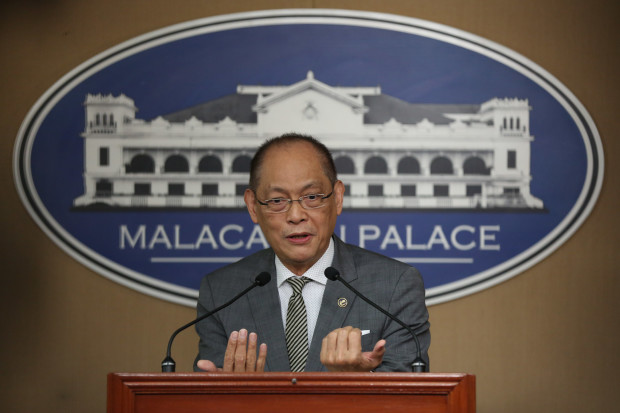
Budget Secretary Benjamin Diokno TOTO LOZANO/Presidential FILE Photo
To finance the P51 billion to be shouldered by the government for free tuition at state universities and colleges (SUCs) next year, some agencies’ budgets may be slashed on top of possibly issuing a supplemental budget.
Budget Secretary Benjamin E. Diokno told a press conference Wednesday that since President Rodrigo Duterte committed to implement the free tuition scheme in the first semester of school year 2018-2019, “with or without money, we will look for them.”
READ: Duterte signs free tuition law
Diokno said the cost to shoulder free tuition at public universities as well as colleges would jump to P70 billion by 2021, as full implementation will be in four years’ time.
“We will finance it, one way or another,” Diokno said.
One option will be to “find ways to cut” some agencies’ budgets for next year, Diokno said, although they have yet to determine which agencies will suffer a budget cut.
He said the Department of Budget and Management (DBM) is in constant touch with the House appropriations and Senate finance committees as they determine whose budgets would be slashed.
“If necessary, we might submit a supplemental budget,” Diokno added, but only “if worse comes to worst.”
In a statement, the DBM noted that Republic Act No. 10931 or the Universal Access to Quality Tertiary Education Act signed by President Duterte last month will cover eight SUCs in Metro Manila, 49 in Luzon, 26 in the Visayas, as well as 29 in Mindanao.
RA 10931 also covers Commission on Higher Education (Ched)-accredited local universities and colleges as well as Technical Education and Skills Development Authority (Tesda)-run technical vocational institutions.
“The law will exempt all enrolled students from 2018 onwards from paying tuition, miscellaneous and other school fees such as registration fees, laboratory fees, among others,” the DBM noted.
“In order to ensure merit-based admission to public higher education institutions (HEIs), the DBM is proposing a national entrance examination for all aspiring enrollees, on top of tightening admission and retention policies in HEIs,” it said.
“Another component of the law is the tertiary education subsidy, which will provide allowance for books, school supplies, transportation, and miscellaneous personal expenses to select student beneficiaries. Students who are part of 4Ps [Pantawid Pamilyang Pilipino Program] beneficiary-households will be prioritized for the subsidy, while students who are not part of such households will be evaluated based on income,” it added.
“Student loan options will also be made available for students from private universities. Funds for such loans will be sourced from Ched’s ‘study now, pay later’ program which has an allocation of around P54 million in the proposed 2018 budget. Ched and the DBM are currently exploring other possible mechanisms to allow loan options in private HEIs, such as entering into guarantees with government-owned banks such as the Land Bank of the Philippines and the Development Bank of the Philippines,” according to the DBM.
To make the law sustainable, “we told SUCs that during the transition, there should be no expansion of capacity, no expansion of students that their current facilities can cover,” Diokno said.
“We will not allow universities to have more students during the transition… We will not create new universities,” he added. JPV